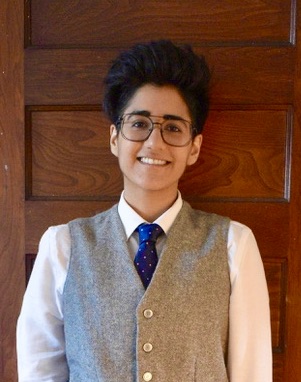Meet Dr. Aqdas Aftab!
Hear from affliate faculty Aqdas Aftab about their approach to teaching WSGS classes and their recent research!

Dr. Aqdas Aftab is an Assistant Professor of English and WSGS affiliate faculty member.
What is your favorite part about teaching WSGS affiliated courses?
My favorite part about teaching WSGS courses is the world of feminist, queer and trans possibility that I inhabit in my classroom. The space that I co-create with my students allows us not only to deconstruct and critique systems of power and oppression, but also to imagine other ways of being that are outside white cisheteronormativity. There are beautiful moments of personal and political change that I get to witness in my WSGS affiliated courses, and these moments give me hope for a more just world.
What interested you in teaching courses that center marginalized voices?
So many of the topics and texts that are centered in the U.S. academy are white and Western, not only in terms of the people producing them, but also in regards to the frameworks they assume to be “universal.” This is why I think it is necessary to examine the roots of knowledge production; to explore how our ways of thinking are often insidiously conditioned by systems of power. I teach marginalized voices not for the sake of adding “diversity” to the colonial white academy, but because these marginalized voices have the potential to disrupt the systems of racial capitalism and settler colonialism that academia often relies on. A syllabus centered on and around marginalized voices – particularly queer and trans BIPOC voices – can offer radically liberatory ways of understanding humanness.
What are your areas of research and what are you working on now? What is most exciting about your project?
My research lies at the intersections of transgender studies, queer of color critique, postcolonial and decolonial theories, African diaspora literatures and South Asian literatures. Mainly, I explore how the imposition of the modern gender binary is central to the processes of racialization and colonialism. I am particularly interested in the concept of interiority, and how it can allow us to reimagine trans of color life. I am currently working on my first book project which argues for the importance of reading for interiority (affect, spirituality and speculation) in trans of color literary texts as a strategy to evade the colonial cis gaze. The most exciting thing about this project has been my research on coalitions between Black and Dalit feminists. Both feminisms, despite their different regional histories, challenge the cisgender binary in amazingly similar ways, and teach me ethical ways of building transnational solidarity around trans liberation.
What advice would you offer to someone who wants to take a WSGS-related course?
To anyone wanting to take a WSGS course, I would ask them to keep a journal of how their everyday life is shifting by the theories they are reading in the classroom, and to consider how their personal is connected with the academic. I would want them to pay attention to the personal transformation they are undergoing in their WSGS courses, and to track how their bodies (not only their minds) are responding to new forms of knowledge. I would also ask them to lean into and learn from the discomfort that often comes with our core assumptions being challenged.
What's one thing you think every Loyola student should experience before graduating?
I think every Loyola student should try to take a creative course (whether its studio art or dance or creative writing) before they graduate so they can have structured time and space to experiment with their imaginations.


